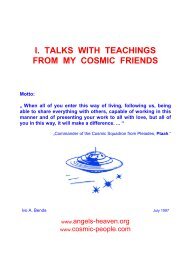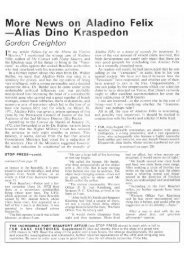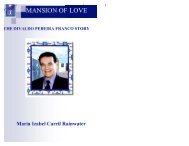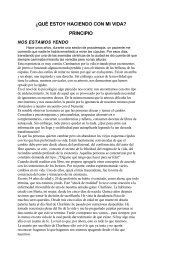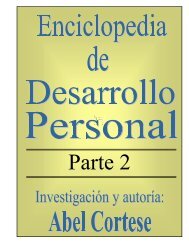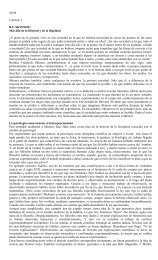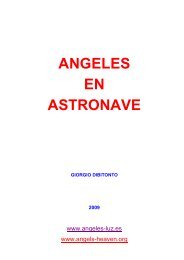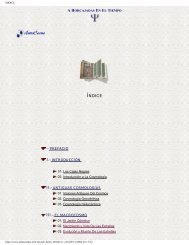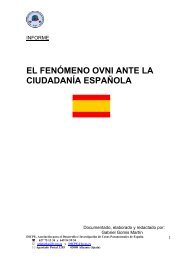The Word That is God
The Word That is God
The Word That is God
You also want an ePaper? Increase the reach of your titles
YUMPU automatically turns print PDFs into web optimized ePapers that Google loves.
of speech and life-force in the intonation of Om that reveals the likeness of the individual<br />
consciousness (jiva) to Brahman Itself.<br />
“Speech and Life-force are joined together in the Syllable Om.” Both speech and prana are<br />
manifested and reunited in the repetition of Om. Om <strong>is</strong> the point of their origin and their<br />
return. Om <strong>is</strong> the source of all things, and therefore of speech and prana. By Om we begin<br />
moving back to the state where they are one.<br />
<strong>The</strong>re <strong>is</strong> a very practical side to th<strong>is</strong>, for: “Verily, whenever the pair come together, they<br />
fulfil each other’s desire. He who knowing th<strong>is</strong> thus, meditates on the Syllable, becomes,<br />
verily, a fulfiller of desires.” Om being the source of all and the manifester of all <strong>is</strong> obviously<br />
the accompl<strong>is</strong>her of all. He who has h<strong>is</strong> consciousness united with Om will accompl<strong>is</strong>h whatever<br />
he desires. Th<strong>is</strong> <strong>is</strong> supported by the upan<strong>is</strong>hadic seer pointing out that in Vedic rituals Om<br />
was employed as a term of assent. <strong>The</strong>refore whatever an adept in Om Yoga desires, it will be<br />
assented to.<br />
Since prana also means breath, the foregoing applies to the joining of Om to the breath in<br />
the practice of Om Yoga. <strong>The</strong>re <strong>is</strong> simply no compar<strong>is</strong>on possible between the religious<br />
endeavor of the religion<strong>is</strong>t who knows of Om, but does not know Om by direct experience, and<br />
the Om Yogi who does know. For Om <strong>is</strong> Divine Power Itself.<br />
“He obtains w<strong>is</strong>hes by singing [intoning], who knowing th<strong>is</strong>, meditates on the udgitha<br />
[Om] as the syllable. Th<strong>is</strong>, with regard to the self.” (Chandogya Upan<strong>is</strong>had 1.2.14)<br />
We are frequently going to encounter the word udgitha in the upan<strong>is</strong>hadic verses regarding<br />
Om. Om <strong>is</strong> essential for all Vedic recitations and rites, being intoned throughout. It <strong>is</strong> technically<br />
referred to as “the udgitha” in the ceremonial texts, and the upan<strong>is</strong>hads also use that term to<br />
underscore its prime value and dignity as the essence of the Vedas.<br />
Those who desire to know the Self as they engage in the japa and meditation of Om shall<br />
indeed obtain that knowing.<br />
“One should meditate on the udgitha as th<strong>is</strong> syllable [Om]….Verily, the gods, when they<br />
were afraid of death, took refuge in the threefold knowledge [of the Rig, Saman, and Yajur<br />
Vedas]. …Death saw them there in the Rig, in the Saman and in the Yajus just as one might<br />
see a f<strong>is</strong>h in water. When they found th<strong>is</strong> out, they rose out of the Rig, out of the Saman, out<br />
of the Yajus and took refuge in sound. Verily, then one learns the Rik, one sounds out Om. [It<br />
<strong>is</strong>] the same with Saman; [it <strong>is</strong>] the same with Yajus. Th<strong>is</strong> sound <strong>is</strong> that syllable, the immortal,<br />
the fearless. Having entered th<strong>is</strong>, the gods became immortal, fearless. He who knows it thus,<br />
pra<strong>is</strong>es th<strong>is</strong> Syllable, takes refuge in that Syllable, in the immortal, fearless sound, and having<br />
entered it, he becomes immortal, even as the gods became immortal.” (Chandogya Upan<strong>is</strong>had<br />
1.4.1-5)<br />
<strong>The</strong> Rig Veda has told us that the gods repose on/in the bindu of Om, the center of all<br />
being, the “heart” of <strong>God</strong>. Now we are being given an account of how they ascended to<br />
immortality. While examining th<strong>is</strong>, we should keep in mind that the “gods” not only ex<strong>is</strong>t in<br />
the subtle cosmos, but they ex<strong>is</strong>t also in us. <strong>The</strong>refore a parable about the external gods<br />
reveals the inner spiritual faculties that correspond to them.<br />
<strong>The</strong> gods felt they would be safe from death by merging their consciousness with the<br />
Vedic sound-powers. Th<strong>is</strong>, of course, was fool<strong>is</strong>h, since all that begins must end. Only the<br />
eternal abides unchanging and forever. Just as creation <strong>is</strong> cyclic, so also <strong>is</strong> the sounding forth<br />
21



